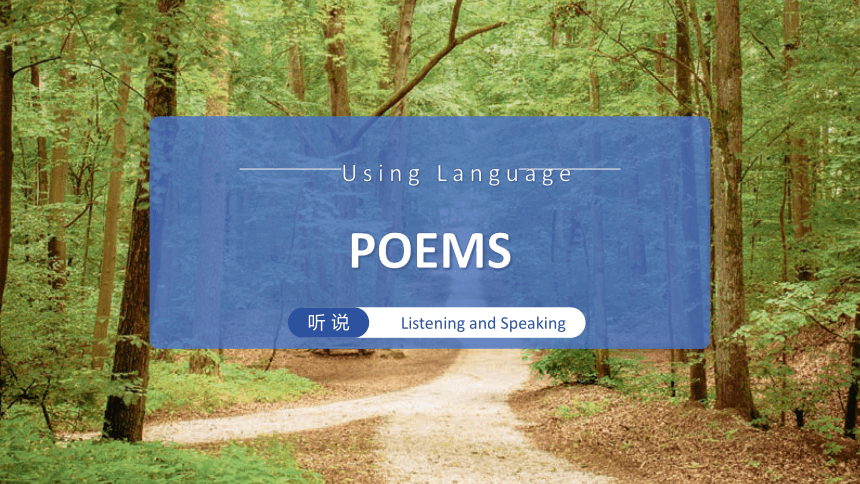(
课件网) POEMS Using Language Listening and Speaking 听说 By the end of this class, you will be able to: learn to predict what you will hear by your own knowledge. use proper English to praise and encourage others by applying them in the conversation. Learning Objectives: Warm-up part 1 Predict rhythm image rhyme Why do you like reading them Do you like reading poems Predict Would you like to write poems What prevents you from writing poems Lack of inspiration. / nsp re n/ a person or thing that is the reason why sb. creates or does sth. Pre-listening part 2 rhythm, rhyme, image Lead in Talk about English Poetry Contest Our school English Poetry contest is coming. What do you think of the poem below Image is boring because of a lack of inspiration. In the morning I wake up, Everyone tells me to work hard, Deep into the night I stay up, Couldn’t sleep a lot. Lead in Ask and answer How can we get inspiration in our daily life listen to insects singing enjoy the shapes and colours of flowers sit quietly by yourself row a boat on the lake watch clouds moving breathe fresh air While-listening part 3 Listen to Part 1 and answer the questions. When is the deadline for the poetry contest What does Nora mean by saying that she needs time to polish her writing Why doesn’t Pitt want to enter a poem contest What does George plan to do 24 June. Nora means it’s not finished, and she needs some time to change it and make it better. Because he can’t think of anything to write about. He plans to write his poem on the weekend but only if he feels inspired. Task 1 Listen for detailed information George: Nora: Pitt: Plans to _____ in the countryside and _____ somewhere by himself so he will notice a lot more to _____. Writes best when _____ familiar things and will _____ too. _____ while _____ poetry. go for a hike inspire interesting thoughts and words try George’s methods surrounded by Listens to music working and writing sit quietly Task 2 Listen to Part 2 and find out how the students will inspire themselves to write poetry. Task 3 Listen to the two parts again and tick the expressions you hear that are used to praise and encourage somebody. That's a good idea. That's a good effort. What a great idea! Keep up the good work. I think that's a fantastic idea. Come on, you can do it. I like that idea. You are doing well. Your ideas sound very encouraging to me. Do your best. You know what That's a good idea. Give it your best shot. Praising and encouraging √ √ √ √ Post-listening part 4 Task 4 Listen and practise reading the following poems aloud. Pay attention to the rhyming words and the rhythm of the poems. Read poetry aloud Poetry should always be read aloud, as that is when you can hear the music of the words. When reading poetry aloud, start slowly. Find and emphasise the rhythm of the words. Begin to think about how the poem makes you feel – happy, sad, in love – and read the poem with emotio ... ...

